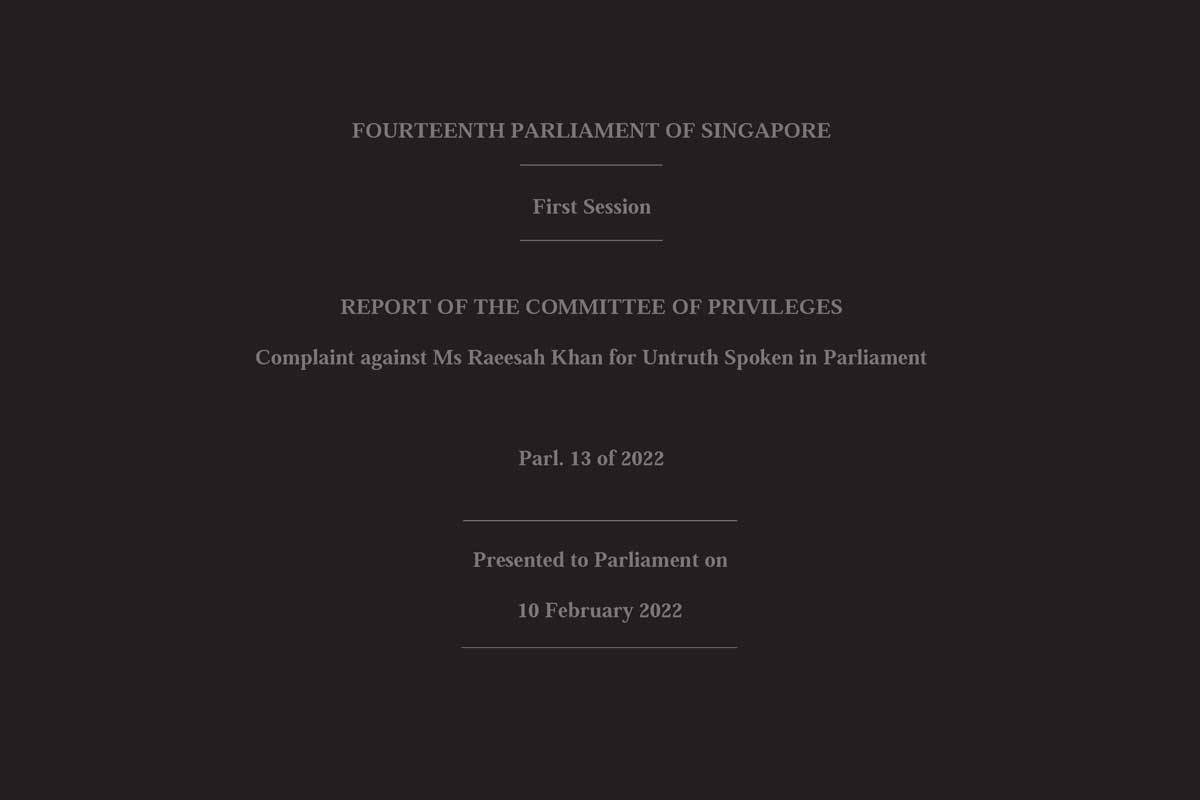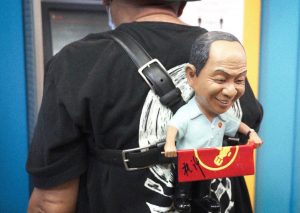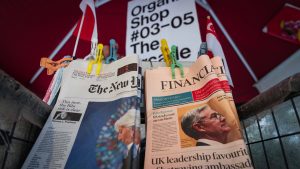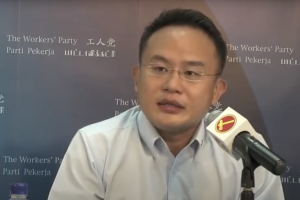Top image: COP Report/Parliament of Singapore
What was a rather mundane and sleepy Thursday afternoon in the office quickly erupted into excited chatter and gasps at the announcement of the report by the Committee of Privileges (COP). This report is the long-awaited result of the COP’s investigation after ex-MP Raeesah Khan spoke an untruth in Parliament.
The proceedings were lengthy, and the reports, even longer—a total of six that came in at a hefty 1,180 pages. There was plenty to parse through, but we were more concerned with the main report, which, at 319 pages, is anything but brief. Still, in reading the report, I cannot help but notice the language used in detailing the events that have transpired.
As someone who trafficks and negotiates with words and their nuances daily, the choices made here are undeniably colourful and, at parts, over-zealous especially when used to present factual findings. Undoubtedly, words are powerful, and wielding them can actively influence and shape any situation—quite possibly a tenet a career staffer somewhere in the office of the COP holds dear to their heart.
While we might be focused on the result of the COP report, it is equally pertinent to examine and address how the report is presented to us. In a formal document such as this one, which is also set to be delivered to parliament, the intention behind the language has to be questioned. And by extension, what audience this report is meant for and the implications that follow.
The use of emotive language
In reading a report like this, the natural expectation is impartiality in presenting the facts and in many instances here, it is. We expect the language to be neutral or even clinical. After all, the facts are laid out plainly, and the evidence, indisputable.
Still, there is nothing wrong with emotive language, and as an English major, I relish it immensely. But, in this case, the problem arises when the words used move beyond a mere description of events and begin to influence our perception of the people involved.
Cuddon defines emotive language in The Penguin Dictionary of Literary Terms and Literary Theory as “language intended to express or arouse emotional reactions towards the subject matter or the addressee; to be distinguished from the referential (or scientific) language, which aims only to denote”. Emotive language is meant to trigger a response, and those responses are used as tools of persuasion to shape our reality and, in this case, likely our view of the Worker’s Party.
We can see this clearly in words like “travesty” (pg 117, pt 164), “shameful” (pg 59, pt 184), and “surreptitious” (pg 91, pt 49 & 50 )—words that go beyond a mere description of an action. These charged and loaded words may coerce the reader to cast judgment on the action and, in so doing, colour their understanding of what transpired.
Take “travesty”, for instance, a word defined as presenting something in a false, absurd, or distorted way, used to reference the forming of the Disciplinary Panel (DP) by Worker’s Party (WP). Usage of “travesty” seems to hint not only at WP’s decision-making process but also at how they run their party.
Furthermore, the use of the word “shameful” in describing Mr Pritam Singh’s actions towards Ms Loh Peiying and Mr Yudhishthra Nathan garnered the same effect. Earlier in the sentence, the report calls his actions “un-Parliamentary”(pg 59, pt 184). This already denotes the gravity of his actions as a leader and an MP—continually calling it “shameful” seems gratuitous and directs the attention and focus to Mr Singh’s character.
While the choice of words is telling, the frequency of them being used is also notable. The terms “surreptitious” and “surreptitiousness” (pg 48, pt 142(1); pg 92, pt 51; pg 99, pt 69 (7)) were used a total of five times in the report. In all those occurrences, they were always in reference to Mr Singh’s behaviour.
It is imperative to note that Mr Singh is not the only one afforded these colourful phrases. The words “flagrant”(pg 75, pt 244) and “inexcusable”(pg 75, pt 244) were also used to describe Mr Faisal Manap.
A neat narrative
In all the stories I’ve read, there is always an antagonist the good guys eventually triumph over. Similarly, when analysing the language of the report, whether, for casual elucidation or persuasion, there is a clear ‘villain’ the report might be leading us to.
Take a look at this sentence, “[Pritam Singh] was the primary cause, the operating brain” (pg 70, pt 227). It was already mentioned twice that Mr Singh was the one who started this deceit and pushed the needle forward. Even more so, “operating brain” maybe connotes a sense of devious planning and premeditation, suggesting that only Mr Singh has the intelligence and capacity to commit such actions.
This is also quickly bolstered by the following phrase, describing Mr Singh as the “key orchestrator” (pg 70, pt 227). Again, it’s an interesting choice of words that drives home the image that Mr Singh is the sole ‘mastermind’ behind this series of events, possibly even casting him in a more nefarious position.
Who is all of this for?
While this might have quenched some of my English major sensibilities, we must consider who this report is for. After all, as presented in Scientific Thinking in Speech and Language Therapy, emotive language “sways the emotions of the audience either for or against the view presented”.
Indeed, the readers of this report matter. Two audiences will read this: the Parliament, and, since the report is readily available, everyone else with a stable internet connection and patience at hand.
Ergo, in considering how emotive language “sways emotions”, we have to examine the consequences of this ‘swaying’ and which audiences’ emotions will cause a more extensive and maybe more damaging effect in the long run.
We cannot say for sure the intended intentions with these turns of phrase in the COP report. Perhaps this report’s writer was flexing their skills or being enthusiastic with the language; whatever it is, we may never know for certain. Either way, the COP report is perhaps a sign of significant upheaval and change in our political scene that is only beginning to unfold.







